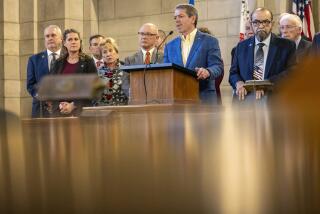GOP presidential hopefuls take dim view of ethanol subsidies
- Share via
Reporting from Des Moines — For decades, nearly every candidate who hoped to win the presidency has visited this state to pledge their allegiance to King Corn and to the government subsidies that have propped up its price and increased demand for it.
But for the first time, the GOP field is dominated by candidates who want to do away with such kickbacks. One even used his formal campaign kickoff in front of the gold-domed statehouse here to announce his opposition to such subsidies.
“Politicians are often afraid that if they’re too honest, they might lose an election. I’m afraid that in 2012, if we’re not honest enough, we may lose our country,” former Minnesota Gov. Tim Pawlenty said in May.
“We need to get government out. … The free market, not freebies from politicians, should decide a company’s success. So, as part of a larger reform, we need to phase out subsidies across all sources of energy and all industries, including ethanol. We simply can’t afford them anymore.”
In previous election cycles, that message was unimaginable, a political rule so ingrained that it was the undoing of a presidential candidate on an episode of “The West Wing.”
Corn still matters in the Hawkeye State. Iowa farmers produce more than 2 billion bushels annually, more than 40% of which is used to make ethanol, a fuel additive that the government had hoped would reduce American dependence on foreign oil.
The state is the beneficiary of a number of agricultural subsidies, but ethanol is the one that has typically drawn the most heat. The subsidy — which goes to the fuel blender, typically an oil company — costs the nation $6 billion annually. Although the farmers don’t receive the subsidy, they benefit because increased demand for corn has raised prices.
However, the subsidy is set to expire at the end of the year, and even ethanol industry groups and the Republican senator from Iowa, cognizant that it has fallen from favor, are amenable to some reductions.
The GOP field largely opposes the subsidy. In addition to Pawlenty, former Sen. Rick Santorum and businessman Herman Cain have said they favor phasing it out, while Rep. Michele Bachmann has called for a reexamination of all energy subsidies. Rep. Ron Paul (R-Texas) has long opposed all subsidies. Former Massachusetts Gov. Mitt Romney has supported such subsidies, but has said they should be phased out once an industry is established.
Former Utah Gov. Jon Huntsman Jr. used his opposition to ethanol, corn and soybean subsidies to explain why he is not competing in Iowa.
“I probably won’t be spending a lot of time in Iowa. I understand how the politics work there,” Huntsman said in June.
Political strategists largely believe that his decision is prompted by his inability to compete in the state because of his moderate stances on issues such as immigration, as well as his Mormon faith, which could be obstacles among the state’s conservative and evangelical caucus-goers.
Iowans simply didn’t buy his rationale.
“To me, it doesn’t seem like it’s true. He could still compete,” said Marietta Vance, an undecided Republican from Hazelton. “They feel maybe they couldn’t make a real strong stand, and they’re using it as the reason, but it’s not the actual truth.”
Recent polling bears this out: More than three-quarters of likely GOP voters in Iowa reported that they would consider supporting a candidate who favored eliminating ethanol subsidies.
Several factors are likely behind this shift. In the short term, voters have recently become heavily focused on the nation’s spending, debt and deficit, and some who once supported such subsidies say the nation can simply no longer afford them.
“The issues that are at the top of the minds of average Iowa caucus-goers, much like most Americans, are issues relating to the economy, creating private-sector jobs and stopping unsustainable spending out of Washington, even those Iowans who make their living off the farm economy,” said state GOP Chairman Matt Strawn, the son and grandson of corn and soybean farmers. “They’re just as concerned as anyone about the long-term, looming financial issues.”
But longer-term trends are also behind the move, said Bruce Babcock, a professor of economics and director of the Center for Agricultural and Rural Development at Iowa State University.
“Ethanol doesn’t need the subsidies it had in the past,” he said. “The economics have changed.”
The ethanol industry began when oil was cheap, and gas producers needed an incentive to blend their fuel with ethanol. But the industry has matured and today’s high oil prices make adding ethanol profitable even without the subsidy. Additionally, MTBE — an additive that competed with ethanol — fell from favor in the last decade because it can contaminate groundwater. Also, Iowans are leaving rural farming areas for cities, so they have less connection with agriculture than they once did.
The opposition to the subsidies has created strange bedfellows — among them anti-tax groups, environmentalists and those concerned with rising food prices. Even many farmers favor ending the ethanol subsidies, if those for oil are curtailed as well.
“Originally, it was probably a good thing to have them to get the industry going,” said Todd Kalkwarf, an undecided Republican who raises corn, soybeans and sheep on 1,000 acres in Aplington, about two hours northeast of Des Moines. “We’re at the point now where we could slowly start to wean that away.”
He said the nation’s fiscal crises made such a move more palatable.
“We’re all aware of the cuts that need to be made,” said Kalkwarf, 40. “We’re going to have to be at the table to talk about that. Everyone’s pretty much honest that that’s going to happen.”
More to Read
Get the L.A. Times Politics newsletter
Deeply reported insights into legislation, politics and policy from Sacramento, Washington and beyond. In your inbox twice per week.
You may occasionally receive promotional content from the Los Angeles Times.











